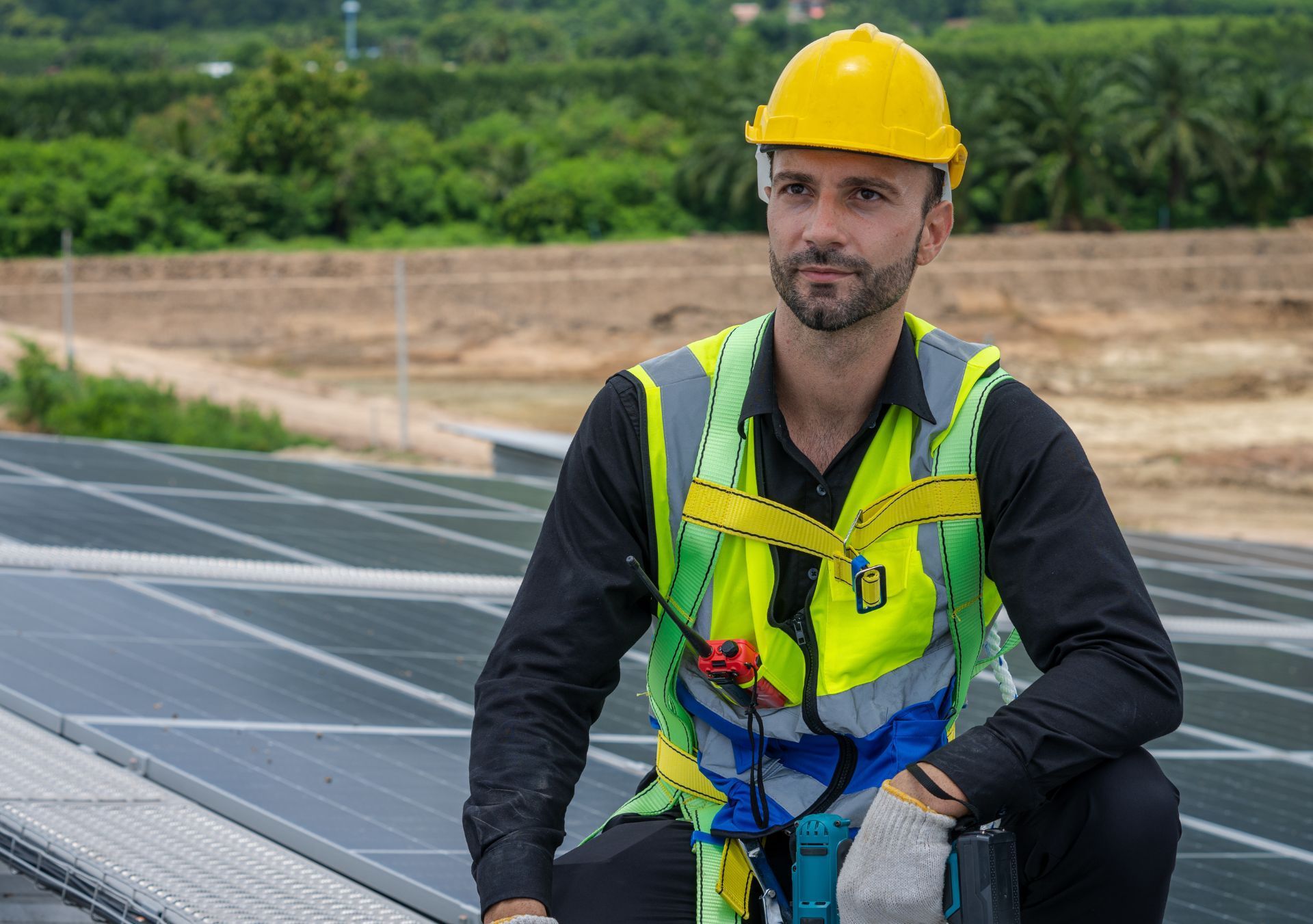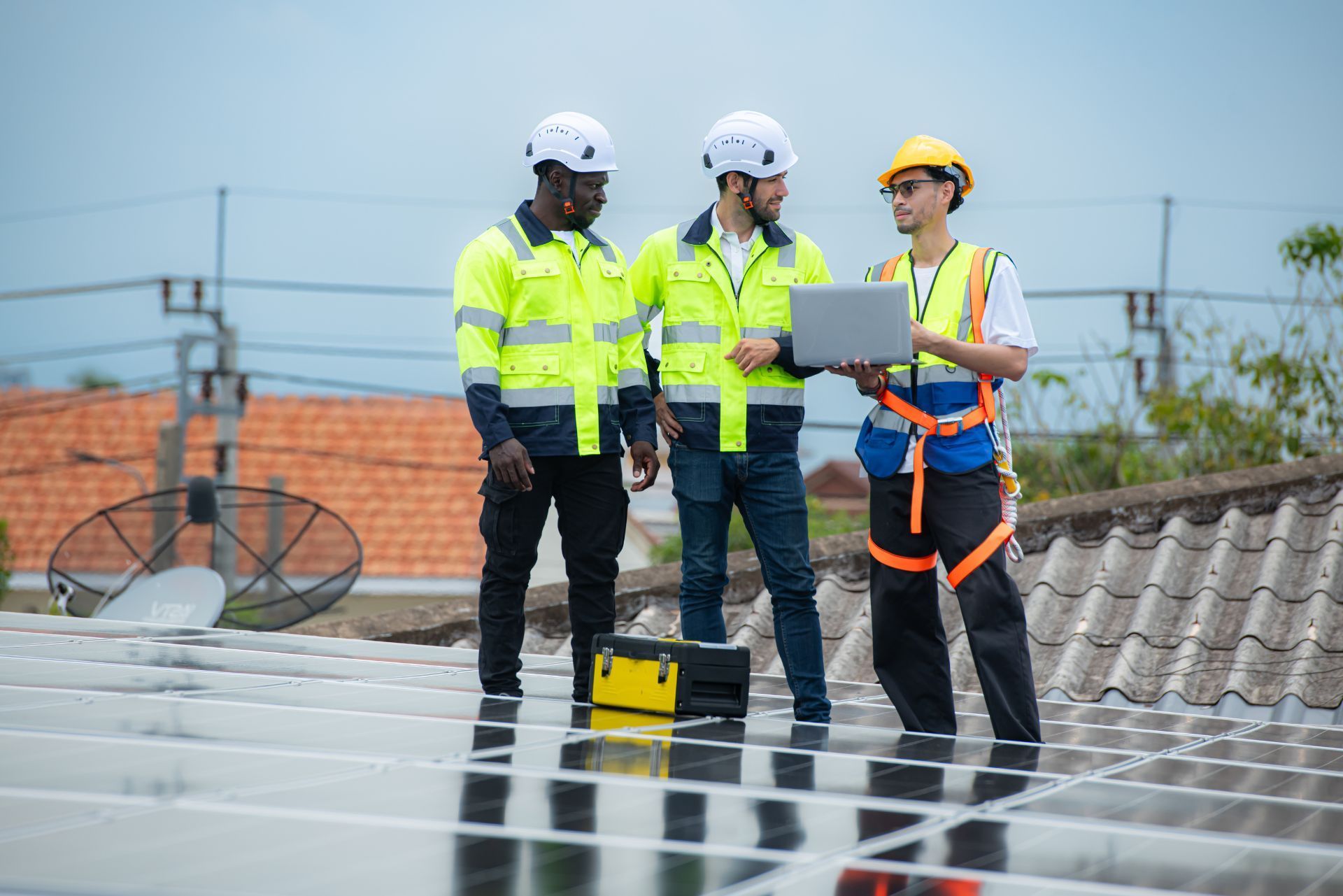New York Solar Installer Insurance
See How We're Different:
or Call Us: 212-425-8150

Most Common Business Policies
Index
Understanding the Unique Risks in Solar Installation
Key Insurance Coverages for New York Solar Contractors
Adapting to Market Changes and Regulatory Challenges
How Much Does Solar Installer Insurance Cost in New York?
Protecting Your Business Against Underperformance and Maintenance Risks
What to Remember When Choosing Insurance for Your Solar Business
Contact Us
New York’s solar industry has exploded in recent years, with installations increasing by more than 2,000% over the past decade. This rapid growth has created significant opportunities for local contractors but also brought new risks that require careful management. Whether you’re a seasoned solar installer or just starting out, understanding the right insurance coverage is essential to protect your business, your workers, and your investments in this booming market. This guide breaks down what New York solar contractors need to know about insurance to navigate this dynamic industry confidently. For a deeper dive into the state’s solar expansion, Cornell University’s
Climate Jobs Institute offers detailed insights.
Understanding the Unique Risks in Solar Installation
Solar installation is not your typical construction work. It involves working at heights, handling electrical components, and exposure to weather conditions that can change rapidly. These factors increase the risk of accidents and property damage. In New York alone, there were upwards of 14,000 solar construction workers in 2023, highlighting how many people are exposed to these risks daily.
One challenge specific to solar is the payment structure for workers. A recent study from Cornell University found that 34% of solar workers are paid per panel installed. While this incentivizes productivity, it can also lead to rushed jobs and unsafe working conditions. This risk factor makes having robust workers compensation and liability coverage even more critical.
Additionally, extreme weather events are becoming more frequent and severe, posing threats to solar assets and installations. According to the 2023 Solar Risk Assessment Report by kWh Analytics, these events, combined with a shortage of skilled labor, challenge the industry’s sustainable growth. Contractors must prepare for these risks with tailored insurance policies that cover both physical damage and business interruptions.
Moreover, the technical nature of solar installations requires a high level of expertise and ongoing training. New technologies and methods are continually emerging, necessitating that workers stay updated on best practices and safety protocols. This continuous learning can be a double-edged sword; while it enhances worker safety and installation quality, it also places additional pressure on companies to invest in training programs. The financial implications of such investments can be significant, particularly for smaller firms trying to remain competitive in a rapidly evolving market.
Furthermore, the integration of solar installations into existing infrastructure presents its own set of challenges. Many older buildings may not be structurally equipped to support solar panels, leading to potential hazards during installation. This issue is compounded by the need for compliance with local building codes and regulations, which can vary widely. Navigating these complexities requires not only skilled labor but also a thorough understanding of local laws and standards, adding another layer of risk that contractors must manage effectively.

Key Insurance Coverages for New York Solar Contractors
Solar contractors face a mix of general construction risks and specialized exposures related to renewable energy systems. Here are the essential insurance coverages every installer should consider:
General Liability Insurance
This coverage protects against third-party claims of bodily injury or property damage. For example, if a panel falls and damages a client’s property or injures a passerby, general liability insurance covers legal fees and settlements. Given the physical nature of solar work, this is a must-have. Additionally, it can cover incidents that occur during the installation process, such as accidents involving scaffolding or ladders, which are common in the construction industry. The financial implications of a lawsuit can be devastating, making this coverage not just advisable but essential for any contractor looking to protect their business.
Workers Compensation
In New York, workers compensation is mandatory for most employers. It covers medical expenses and lost wages if an employee is injured on the job. Considering the physical demands and risks of solar installation, this coverage protects both workers and contractors from costly claims. Moreover, it fosters a safer work environment, as contractors are more likely to implement safety protocols and training programs when they know they are financially protected. This not only helps in reducing the number of workplace accidents but also enhances employee morale and trust in the employer.
Professional Liability Insurance
Also known as errors and omissions insurance, this protects against claims arising from design flaws, installation errors, or failure of the solar system to perform as promised. With many systems underperforming due to lack of maintenance or improper installation, as noted by David Kozlowski, founder of New York Electric and Solar, this coverage safeguards your reputation and finances. It is particularly vital in a rapidly evolving industry where technology and best practices are constantly changing. Having this insurance can also provide peace of mind, allowing contractors to focus on delivering quality service without the looming fear of potential litigation over unforeseen issues.
Equipment and Tools Coverage
Solar contractors rely on expensive tools and equipment. This coverage protects against theft, loss, or damage to these assets, ensuring work can continue without costly interruptions. Given the high value of solar panels and installation equipment, even a single incident of theft can significantly impact a contractor's bottom line. Furthermore, this coverage can extend to rented equipment, which is often used for specialized tasks, ensuring that contractors are protected regardless of whether they own or lease their tools.
Commercial Auto Insurance
If your business owns vehicles used for transporting panels and equipment, commercial auto insurance is essential to cover accidents and liability on the road. This coverage not only protects the vehicles themselves but also the drivers and any third parties involved in an accident. With the increasing number of solar installations across New York, contractors often find themselves navigating busy urban areas or rural roads, where the risk of accidents can be heightened. Having commercial auto insurance ensures that contractors can focus on their work without the added stress of potential liabilities from vehicle-related incidents.
Inland Marine Insurance
This specialized coverage protects solar equipment in transit or at temporary job sites. It’s particularly important when moving panels and sensitive components between locations. As solar projects often require transportation over long distances, the risk of damage during transit increases significantly. Inland marine insurance not only covers the equipment but can also include coverage for tools and materials that are stored at job sites, providing comprehensive protection for contractors who frequently move between various locations.
Solar Asset Insurance
For contractors who also own or operate solar systems, protecting these assets against damage, theft, or natural disasters is critical. Jason Kaminsky, CEO at kWh Analytics, emphasizes the importance of managing solar asset risk to ensure sustainable investment and growth in the sector. This type of insurance can cover a range of scenarios, from hail damage to vandalism, ensuring that contractors can maintain their operations without significant financial setbacks. Additionally, as the market for solar energy continues to expand, having solar asset insurance can enhance a contractor's credibility and appeal to potential clients who prioritize risk management in their investments.
Adapting to Market Changes and Regulatory Challenges
Solar contractors must stay alert to shifting policies that affect compensation and project viability. For instance, California’s NEM 3.0 policy, implemented in April 2023, cut compensation for exported rooftop solar generation by about 80%. While New York has not adopted similar measures, such regulatory changes can ripple through the industry, influencing project economics and insurance needs. As these policies evolve, contractors must also be prepared to educate their clients about the implications of these changes, ensuring that customers understand how their investments could be affected by fluctuating compensation rates and incentives.
Contractors should monitor local utility policies and state incentives closely. Changes in net metering or rebate programs can impact project timelines and profitability, which in turn affect risk profiles and insurance coverage requirements. Additionally, the landscape of renewable energy is constantly shifting, with new technologies emerging and market demands evolving. Staying informed about advancements in solar technology, such as battery storage solutions and smart grid integration, can provide contractors with a competitive edge and open up new avenues for project financing and customer engagement.
Moreover, as the solar workforce grows, so does the need to address labor challenges. The Cornell Climate Jobs Institute highlights that many solar workers face payment structures that may encourage unsafe practices. Contractors investing in worker safety and training not only reduce claims but also build stronger teams. Insurance providers often reward such proactive measures with better rates and terms. Furthermore, fostering a culture of safety and continuous education can lead to higher employee retention rates and job satisfaction, which are crucial in an industry facing a skilled labor shortage. By prioritizing these aspects, contractors can not only comply with regulatory demands but also enhance their reputation as responsible employers in the renewable energy sector.
How Much Does Solar Installer Insurance Cost in New York?
Insurance premiums vary widely depending on the size of your business, the types of coverage you select, and your claims history. The national median annual wage for solar photovoltaic installers was $48,230 in 2023, with an hourly rate of $23.46, indicating the scale and professionalism of the workforce. This wage data can influence workers compensation premiums and other labor-related insurance costs.
Smaller contractors might expect to pay a few thousand dollars annually for basic general liability and workers compensation coverage. Larger companies with fleets, expensive equipment, and multiple projects will see higher premiums. Investing in risk management—such as safety training and regular equipment maintenance—can help lower costs over time. Additionally, the type of projects undertaken can also impact insurance costs; for instance, residential installations may have different risk profiles compared to large commercial solar farms, which can necessitate different coverage types and amounts.
It is wise to work with an insurance agent experienced in the renewable energy sector to tailor coverage and find competitive pricing. Don’t settle for generic policies that might leave gaps in protection. Furthermore, understanding the specific risks associated with solar installation work, such as equipment failure, weather-related incidents, or liability claims from third parties, is crucial. Some insurers may offer specialized packages that include coverage for solar panel theft, damage during transport, or even cyber liability for companies that manage customer data digitally. As the solar industry continues to grow, staying informed about evolving insurance options and regulatory requirements will be essential for maintaining comprehensive protection.
Protecting Your Business Against Underperformance and Maintenance Risks
Many solar systems fail to deliver expected performance due to poor installation or lack of maintenance. David Kozlowski warns that too many systems underperform or fail because they are not properly maintained. This creates liability risks for installers, especially if warranties or service agreements are involved.
Professional liability insurance can cover claims related to system underperformance, but contractors should also consider offering maintenance contracts and educating clients on upkeep. This approach reduces disputes and enhances your reputation.
Regular inspections and timely repairs not only protect clients but also extend the life of installations, supporting long-term business success. Combining these practices with comprehensive insurance coverage creates a strong defense against financial setbacks.
In addition to routine maintenance, contractors should emphasize the importance of educating clients about the operational aspects of their solar systems. Providing clients with detailed manuals, instructional videos, or even hosting workshops can empower them to recognize potential issues early on. This proactive engagement not only fosters a sense of ownership among clients but also builds trust, making them more likely to return for future services or recommend your business to others.
Moreover, staying updated with the latest technology and industry standards is crucial. As solar technology evolves, so do the best practices for installation and maintenance. By investing in ongoing training for your team and keeping abreast of innovations, you can offer clients cutting-edge solutions that enhance efficiency and performance. This commitment to excellence not only mitigates risks but also positions your business as a leader in the solar industry, attracting more clients who value quality and reliability.

Frequently Asked Questions
Q: Is workers compensation insurance mandatory for solar installers in New York?
A: Yes. Most employers in New York are required to carry workers compensation to cover employee injuries on the job. This insurance not only protects the workers but also shields employers from potential lawsuits related to workplace injuries. Given the unique risks associated with solar installation, such as working at heights and handling heavy equipment, having this coverage is essential for both safety and legal compliance.
Q: What insurance covers damage to solar panels during installation?
A: General liability covers third-party property damage, while equipment insurance protects your tools and materials. Inland marine insurance can cover panels in transit. Additionally, it's important to consider installation errors or accidents that might lead to damage, which can be mitigated with a comprehensive policy that includes coverage for installation-related mishaps. This ensures that your investment in solar technology is safeguarded throughout the entire installation process.
Q: How can I reduce my insurance premiums as a solar contractor?
A: Implementing safety training, maintaining equipment, and having a clean claims history can help lower premiums. Furthermore, joining industry associations or groups can provide access to resources and best practices that enhance safety protocols. Engaging in regular safety audits and encouraging a culture of safety among employees can also demonstrate to insurers that you are committed to minimizing risks, potentially leading to further discounts on your premiums.
Q: Does professional liability insurance cover system underperformance?
A: Yes, it protects against claims related to design or installation errors that cause the system to underperform. This type of insurance is crucial for solar contractors, as it can cover costs associated with fixing issues that arise from incorrect installations or design flaws. Additionally, having this coverage can enhance your credibility with clients, as it shows that you take responsibility for the quality and performance of your work.
Q: Are there special insurance considerations for solar contractors who also operate solar assets?
A: Yes. Solar asset insurance is recommended to protect against damage, theft, and natural disasters affecting your owned systems. This insurance is particularly vital for contractors who manage multiple installations or larger solar farms, as it can cover a range of risks from vandalism to natural disasters like hurricanes or hail storms. Moreover, understanding the specific risks associated with the geographical areas where your assets are located can help tailor your insurance to ensure comprehensive coverage.
What to Remember When Choosing Insurance for Your Solar Business
New York’s solar market is vibrant but complex. The rapid growth in installations and workforce size means risks are evolving. Contractors must be proactive in managing these risks through comprehensive insurance coverage tailored to their specific operations.
Working with knowledgeable insurance professionals who understand the solar industry ensures you get the right protection without paying for unnecessary coverage. Combine insurance with strong safety practices and client education to build a resilient business ready for the challenges ahead.
For ongoing updates on solar workforce trends and challenges, the
Cornell Climate Jobs Institute provides valuable resources tailored to New York’s renewable energy sector.
